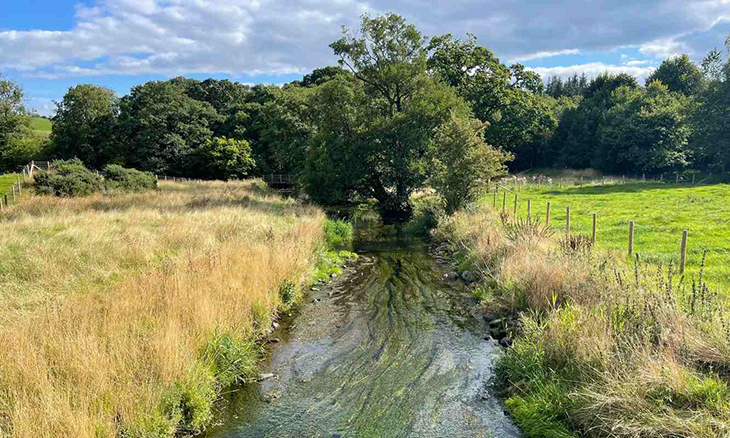
In the United Kingdom, farmers are taking innovative approaches to combat flooding by restoring areas of their farms to a more natural state. This not only encourages wildlife to return but also helps mitigate the risk of floods.
James Robinson, an intergenerational farmer from Cumbria in the northwest England, has collaborated with the Ullswater Catchment Management CIC to transform parts of his farm into wetland havens, resulting in a resurgence of birds and invertebrates.
Flooding is a prevalent natural hazard in the UK, partly due to historical modifications of waterways into deep, straight canals to facilitate transportation. These alterations have increased the volume and speed of water flow, exacerbating flooding issues.
Farmers like Robinson are working to reverse this trend by restoring natural meandering streams, which help slow down and disperse water more effectively during heavy rainfall.
The Ullswater CIC, a Community Interest Company, has observed the success of stream restoration in their region, which encompasses areas like Glenridding, Windermere, West and South Cumbria, and Ullswater.
Danny Teasdale, the CEO of Ullswater Catchment Management, said in a long, on-site interview conducted by DEFRA, “People seem to like this model.”
“And then farmers talk and then someone else will get in touch. We are growing. We’ve been able to employ local contractors, and any money that comes into the CIC goes locally as well,” he adds.
Strickley Farm, where Robinson’s family has farmed for generations, has always had streams running through it, locally known as “becks,” which have been prone to flooding.
Becking the Trend of Flooding
Periodically, Mr. Robinson has found himself dredging the streams, removing weeds and debris – an effort intended for flood control, yet he observed minimal impact on the outcome.
Robinson told DEFRA in his rich, northern accent, “Now this bit of land that we had here, 4 or 5 acres—it was rubbish, in agricultural terms; it was rubbish, but environmentally and its potential or habitat was huge. So might as well really put it to something where it’s actually going to do a better job than it was for farming.”
Teasdale described his process of surveying the surroundings to identify low-lying areas, followed by re-meandering the stream, strategically placing ponds in depressions, and planting clusters of trees spanning approximately ten acres along its banks to combat soil erosion. Additionally, Robinson took measures to protect the area from cattle by erecting fences, allowing the vegetation to flourish undisturbed.
“The amount of life that has come is absolutely phenomenal. We get the extra bird life as well. It’s now a fantastic area where there’s always water, there’s always standing water, even when it’s really, really dry,” he told the Guardian.
Teasdale said, “There’re dragonflies in it, there’s snipe in it,” before adding that Robinson had even seen a barn owl, which hasn’t been seen on the farm in 40 years.
“We’ve come down here one evening and there it was hunting, and we see it most evenings now hunting over there,” says Robinson.
Restoring the natural path and characteristics of streams and rivers offers numerous additional benefits, including enhanced carbon sequestration. Notably, grasslands, especially wetlands, store more carbon underground compared to forests due to reduced plant material decomposition.
Moreover, in the UK’s largest study of its kind, researchers at the UK Center for Ecology & Hydrology discovered that the majority of species thrived better on a partially-rewilded farm than in similar farmed landscapes, all without sacrificing yield.
The scientists attribute this success to various “ecosystem services,” such as natural pest control facilitated by an increased population of insect-eating birds.
Watch the interview for yourself in the video below:
What are your thoughts? Please comment below and share this news!
True Activist / Report a typo


